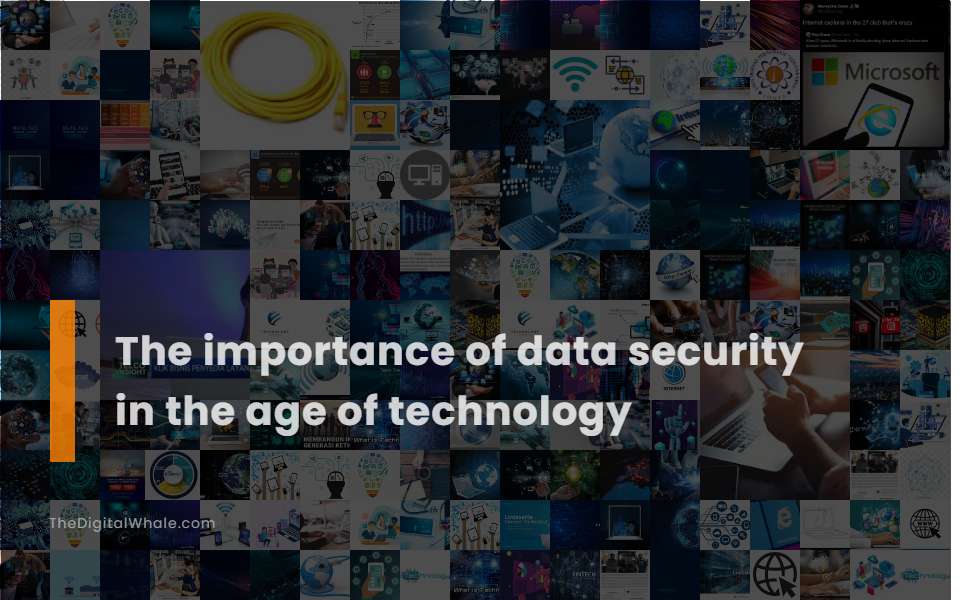The Importance of Data Security In the Age of Technology
How important is data security when it comes to remote work? What are the three main data security risks in the digital age? Let's find out more about The Importance of Data Security In the Age of Technology.

Protecting Personal and Sensitive Information
Protecting personal and sensitive information in the age of digital transformation is crucial due to the increasing complexity of cyber threats and the vast amounts of data generated. Key strategies include data encryption, blockchain technology, AI and machine learning for threat detection, and fostering a culture of security awareness to ensure the integrity, confidentiality, and availability of information. For more insights on these strategies, you can visit the detailed article on Data Security In The Age Of Digital Transformation.
Preventing Cyber Attacks and Data Breaches
Preventing cyber attacks and data breaches in the age of digital transformation requires a multifaceted approach, encompassing several advanced strategies. A critical element is the use of data encryption, alongside the implementation of innovative technologies like blockchain to ensure data integrity. Additionally, adopting AI and machine learning for threat detection can significantly bolster an organization's defense mechanisms. It is equally important to adhere to principles such as strong authentication, regular software updates, and robust access controls to maintain data confidentiality and availability. Organizations must also employ strategies such as using strong, unique passwords and multi-factor authentication, as well as regularly updating software. The strategic implementation of firewalls and endpoint protection, reducing privileges, and encrypting and backing up data play essential roles. Furthermore, as emphasized on the Savvy CFO website, educating employees on cybersecurity best practices and conducting regular security audits is imperative to fortify a resilient defense against cyber threats.
Ensuring Online Transaction Security
Ensuring online transaction security is crucial as it protects sensitive customer data from breaches, prevents fraud through mechanisms like fraud detection and multi-factor authentication, and complies with stringent security standards such as PCI DSS and PSD2, thereby maintaining consumer trust and adhering to regulatory requirements.
Maintaining System Integrity and Availability
Maintaining system integrity ensures that data is accurate, authentic, and reliable, protected from unauthorized modification or deletion through measures like encryption, hashing, digital signatures, and regular audits. Ensuring availability guarantees that systems, applications, and data are consistently accessible to authorized users, achieved through redundancy, fault tolerance, regular software updates, and robust backup and disaster recovery strategies. For a deeper understanding, visit the CIA Triad article, which explores these essential components in detail.
Compliance with Regulatory Requirements
Compliance with regulatory requirements in data security is crucial as it involves adhering to laws like the GDPR, which outlines principles such as lawfulness, fairness, and transparency, and purpose limitation, to ensure personal data is processed and protected appropriately. This not only enhances business continuity but also improves data governance and trustworthiness. For more detailed information, you can visit the Data Protection resource provided by TechTarget.
Related:
How much screen time is too much for children? What's the best way to manage screen time? Let's find out more about How To Manage Screen Time In the Digital Age.
Ensuring Business Continuity
Ensuring Business Continuity in the age of technology requires integrating data security into business continuity planning to protect critical assets from cyber threats, prevent downtime, and maintain customer trust. This approach is crucial for mitigating risks such as data loss, reputation damage, and regulatory penalties. For a detailed exploration of this topic, you can refer to the comprehensive guide on Integrating Cybersecurity into Business Continuity Planning available on Bryghtpath's website.
Protecting National Security
Protecting data security is crucial for national security as it prevents adversaries from exploiting personal and sensitive data for espionage, influence, and cyber-attack operations, thereby safeguarding the country's cyber defenses and strategic interests. This is particularly vital as data security is essential for protecting strategic technologies like artificial intelligence, which are driven by data and have dual-use applications. As outlined in the National Data Protection Strategy, maintaining the integrity of these technologies helps to preserve economic and defense capabilities by controlling their use. Therefore, a comprehensive approach to data security is indispensable for national security, ensuring that both societal and technological interests are adequately shielded against potential threats.
Implementing Data Encryption and Authentication
Implementing data encryption and authentication is crucial in the Age of Digital Transformation as it ensures the confidentiality, integrity, and availability of data. Encryption methods, such as symmetric and asymmetric algorithms, protect data at rest and in transit, while authentication mechanisms like public-private key pairs and challenge-response protocols verify user identities and maintain data integrity. For further insights on this subject, explore more on Savvy CFO, which delves into the intricacies of data security during this transformative era.
Utilizing Advanced Technologies like Blockchain and AI
Utilizing advanced technologies like Blockchain and AI is crucial for enhancing data security in the digital age. Blockchain provides a decentralized, immutable ledger system that ensures data integrity and transparency, while AI enables real-time threat detection, automated response to cyber threats, and dynamic adjustment of encryption protocols to counter emerging threats. For more insights on these technologies, consider exploring the comprehensive information on Data Security provided by Savvy CFO. Together, Blockchain and AI represent a formidable defense against the growing sophistication of cyber threats, placing organizations in a stronger position to protect their vital data assets.
Fostering a Culture of Security Awareness
Fostering a culture of security awareness is crucial in the digital age, as it involves several key components such as education through security awareness training, understanding common threats, practicing digital hygiene, and recognizing social engineering tactics. By focusing on these areas, organizations can effectively reduce cyber risks and enhance both compliance and trust. For more insights on how to bolster security measures, please visit the article on London Daily News that delves deeper into this topic.
Related:
In what ways could technology addiction be harmful to productivity? How does technology addiction impact work? Let's find out more about Technology Addictions and Their Effect On Productivity.
